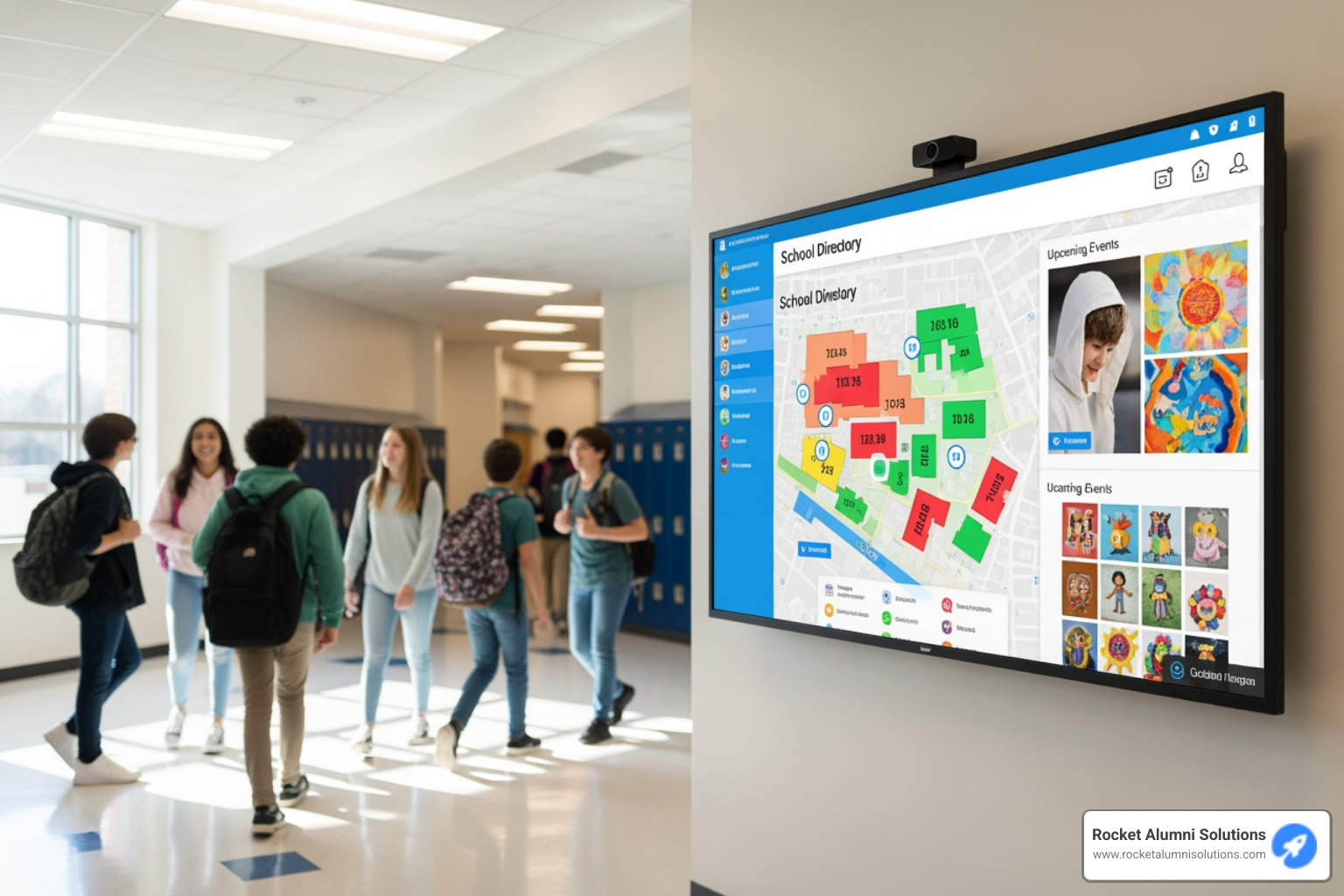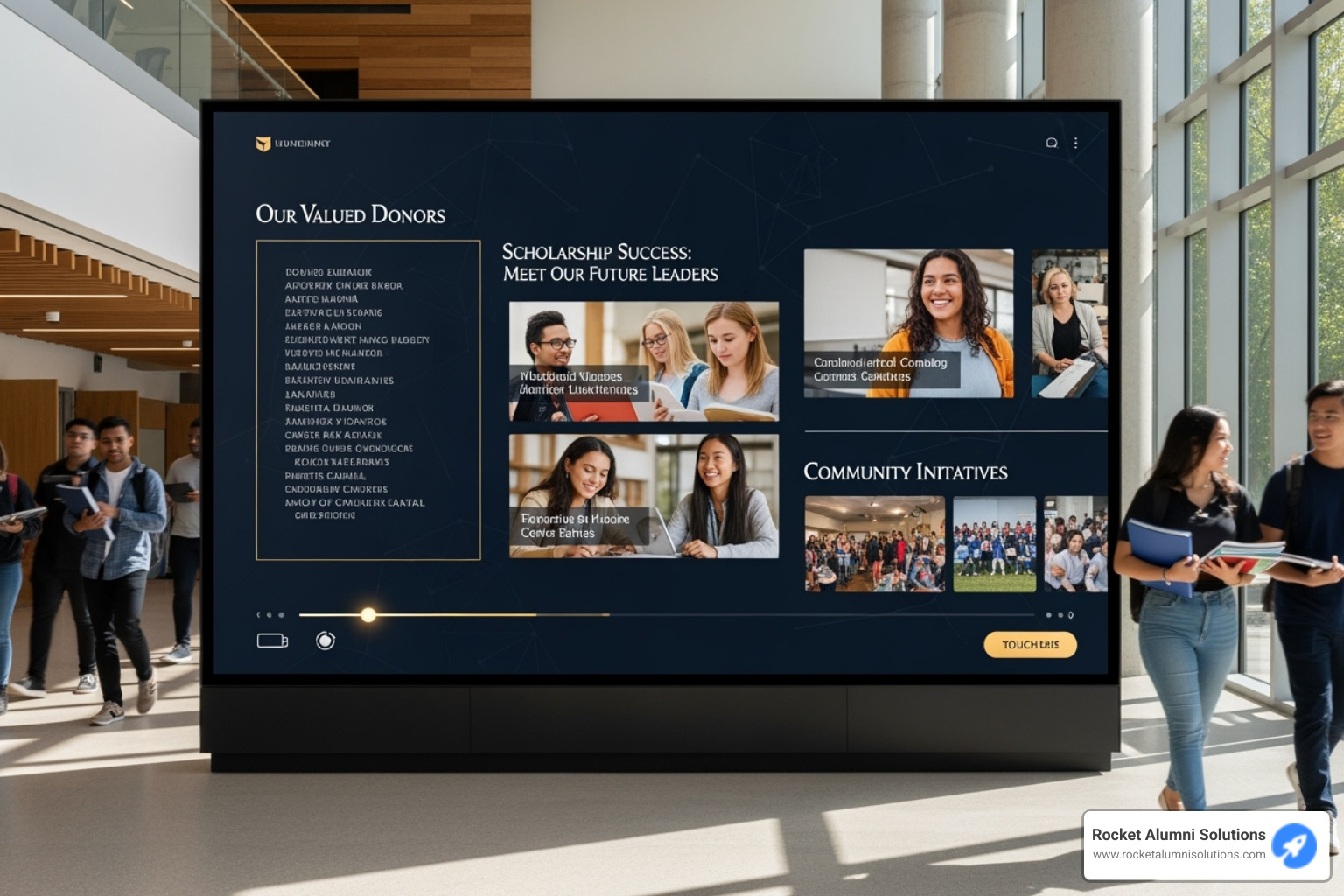Open uping Maryland's Past, One Page at a Time
Digital yearbooks Maryland collections have transformed how we access decades of school memories, turning dusty archives into searchable treasures available 24/7 from anywhere in the world.
Quick Access Guide to Maryland Digital Yearbooks:
- University Collections: University of Maryland (1897-present), McDaniel College (1893-2019), St. Mary's College (1948-1999)
- Free Resources: Internet Archive, FamilySearch, Digital Maryland, university library websites
- Search Methods: Most are downloadable PDFs with text search (Ctrl+F), some are image-only scans
- Best Uses: Genealogy research, alumni connections, local history projects, family tree building
Maryland's educational institutions have been quietly digitizing their yearbook collections for years. The University of Maryland Libraries digitized yearbooks from 1897 onwards, while St. Mary's Archives worked with the Internet Archive to make their 1948-1999 collection searchable online. McDaniel College went even further back, digitizing yearbooks from 1893 to 2019.
These digital archives aren't just nostalgic time capsules. They're goldmines for genealogists seeking ancestor photos, historians researching local communities, and alumni reconnecting with their past. Unlike physical yearbooks gathering dust in closets, digital versions let you search for specific names, browse by graduation year, and share findies instantly with family members.
But navigating Maryland's scattered digital collections can feel overwhelming. Some yearbooks are fully searchable, others are just scanned images. Some collections are complete, others have mysterious gaps. Copyright rules vary, and not every school has joined the digital revolution yet.
I'm Chase McKee RAS, founder of Rocket Alumni Solutions, where we've helped hundreds of schools modernize their recognition and archival systems. Through our work digitizing yearbooks Maryland institutions and creating interactive displays, I've seen how digital access transforms community engagement and historical preservation.
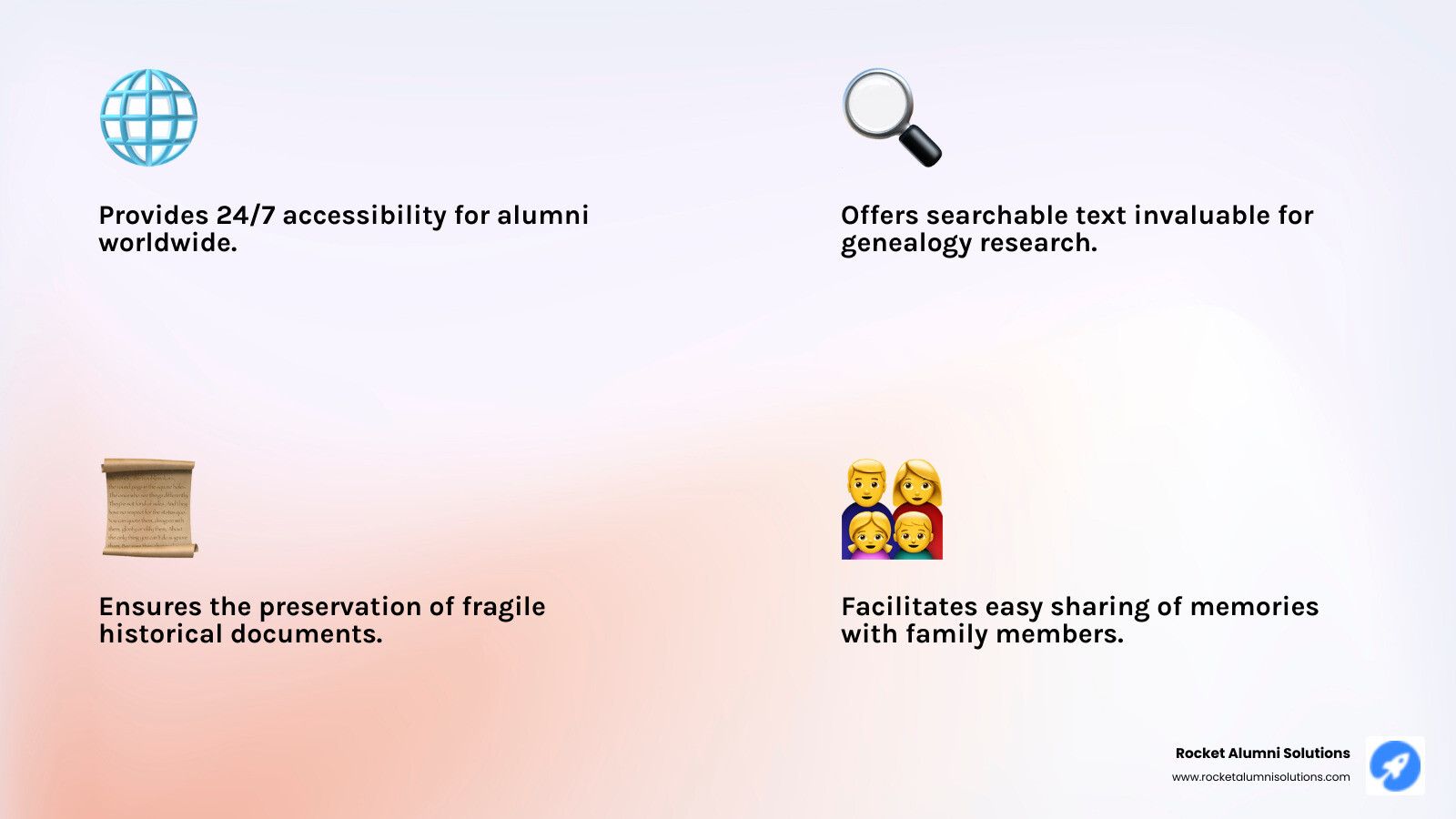
The Genealogical Goldmine: Why Maryland Yearbooks Matter
Picture this: you're searching for your great-grandmother and suddenly stumble across her high school photo from 1952. She's grinning in her drama club costume, surrounded by friends whose names are listed right there on the page. That nickname she always used? Now you know where it came from. Those future plans she mentioned? They're written in her own words beneath her senior portrait.
Digital yearbooks Maryland collections offer exactly these kinds of magical findies for genealogists and family historians.
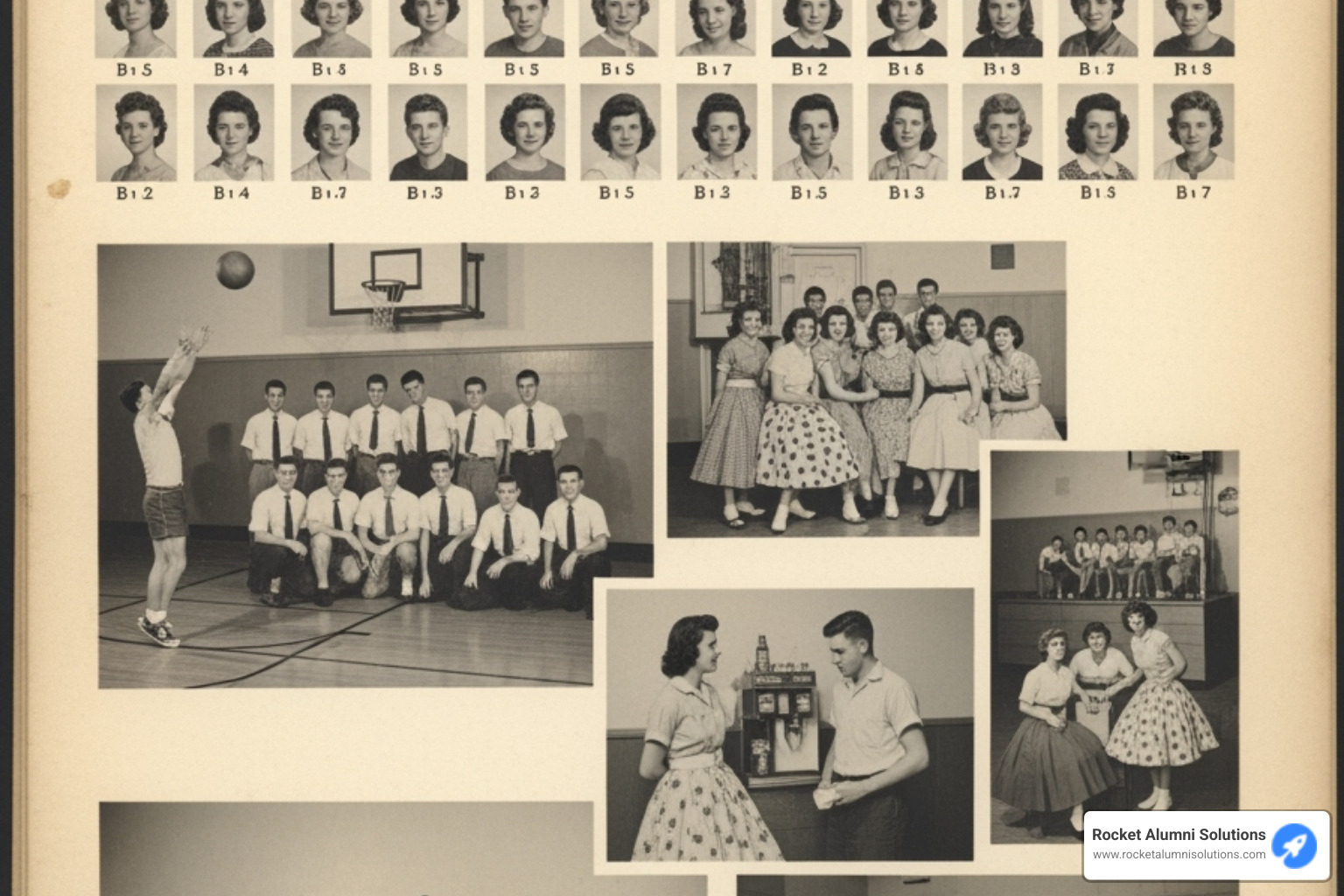
Yearbooks capture the social history that traditional records miss completely. While death certificates and census forms tell us the basics, yearbooks reveal personality. They show us the teenager who became our serious grandfather, the young woman who loved basketball before she became a devoted mother.
The information tucked into these pages goes far beyond student photos. Faculty names help us trace the teachers who shaped entire generations. Club memberships reveal hidden interests and social circles. Sports teams document athletic achievements and friendships that lasted decades.
Even the local advertisements scattered throughout these books paint a picture of community life. They show us which businesses thrived, what products people bought, and how the local economy looked during our ancestors' school years.
As experts at Legacy Family Tree point out, yearbooks provide "story-like information" that brings our family histories to life in ways that formal documents simply can't match.
When you dive into Maryland's digital yearbook collections, you're not just looking at old photos. You're uncovering layers of information that help piece together your family's story.
Full names appear consistently, often with middle names or initials that other records might abbreviate. Graduation years help you nail down exact timelines, especially when family stories get fuzzy about dates.
Photos for identification become incredibly valuable when you're trying to match faces in old family pictures. That candid shot of the debate team or the homecoming court might finally help you identify mystery relatives in your grandmother's photo album.
Family relationships sometimes emerge through shared surnames or activities. You might find siblings attending the same school, or cousins who played on rival teams.
The community context embedded in these yearbooks tells you what life was really like. School traditions, local events, and even the businesses advertising in the back pages all contribute to understanding the world your ancestors steerd daily.
Academic and extracurricular activities reveal talents and interests that family stories might have forgotten. Maybe your great-uncle was actually the star of the school play, or your great-aunt captained the debate team before becoming a homemaker.
As RecordClick genealogists explain, these school memories provide a complete genealogy education, showing us not just who our ancestors were, but how they lived, what they cared about, and who they hoped to become.
The beauty of digital yearbooks Maryland archives is that all this information is now searchable and shareable. You can finally answer those family questions that have puzzled everyone for years.
Your Guide to Free Digital Yearbooks Maryland
Finding digital yearbooks Maryland collections has never been easier, thanks to dedicated librarians, archivists, and institutions who've spent countless hours scanning and uploading these precious memories. What started as dusty volumes tucked away in storage rooms have become accessible treasures that anyone can explore from their living room.
The best part? Most of these collections are completely free to access. You don't need special library cards or research credentials – just an internet connection and a bit of curiosity about Maryland's educational history.
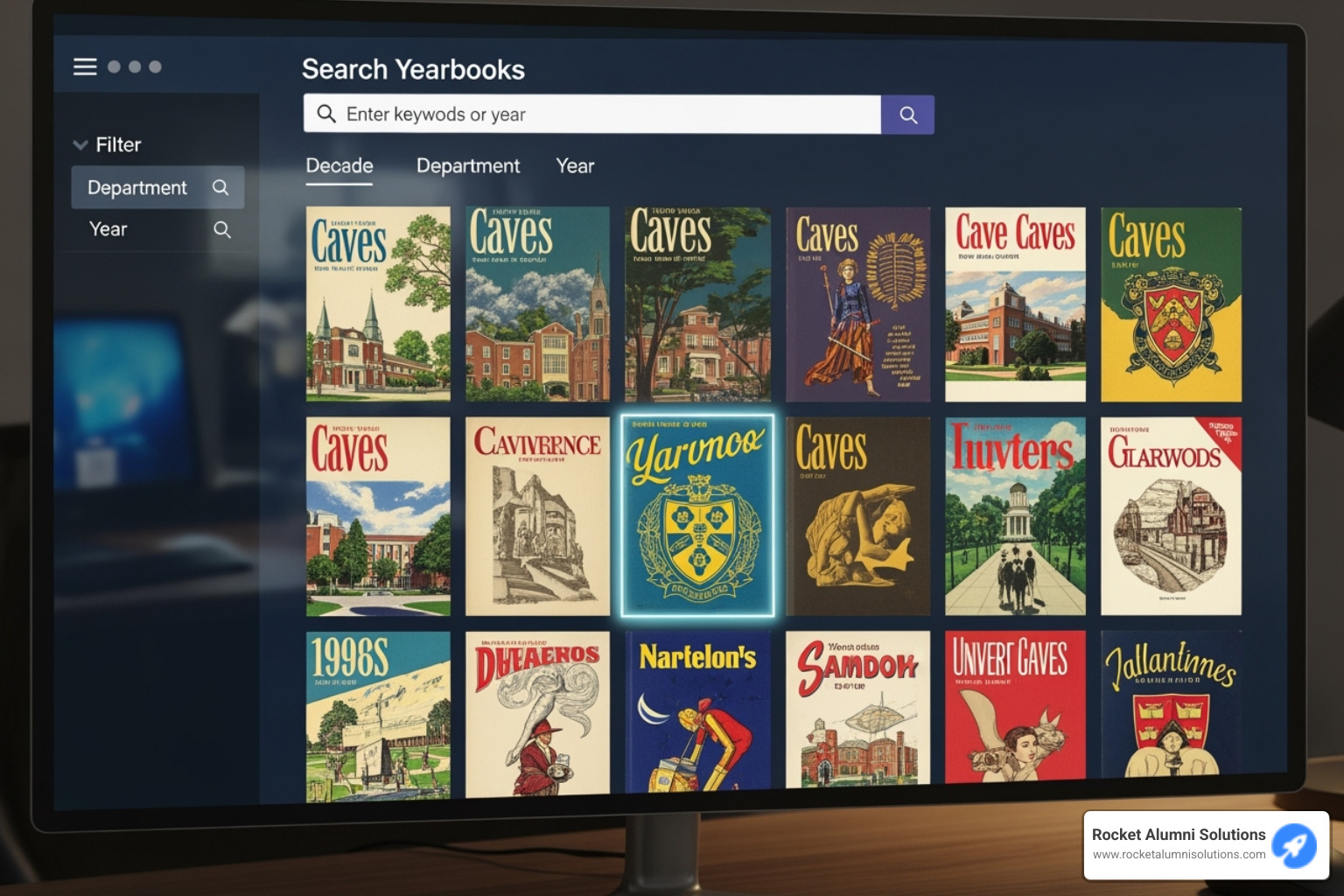
Let me walk you through where to find these digital gems, starting with the institutions that have really gone above and beyond in preserving their history.
University and College Digital Yearbook Maryland Collections
Maryland's colleges and universities have led the charge in digitizing their yearbook collections. These institutions understand that their yearbooks aren't just school memorabilia – they're historical documents that tell the story of Maryland's educational and social evolution.
The University of Maryland, College Park has created one of the most impressive collections you'll find anywhere. Their yearbooks, originally called "Reveille" starting in 1897, later became known as "Terrapin" in 1935. That first 1897 edition was quite something – over 130 pages documenting the history of what was then the Maryland Agricultural College. By 1970, these yearbooks had grown to more than 560 pages!
Every volume is available as a searchable PDF through the University of Maryland Libraries Collection. We've had the privilege of partnering with the University of Maryland on their digitization efforts, and I can tell you how committed they are to preserving these memories for future generations.
McDaniel College (formerly Western Maryland College) has digitized an incredible span of history – yearbooks from 1893 to 2019. Their collection includes the "Aloha" and "Crossroads" series, plus some unique early editions like "Chic-a-go-runk" from 1896. There are some gaps where no yearbooks were published, particularly between 1917-1921, which tells its own story about how world events affected campus life. You can explore their entire collection through McDaniel College Archives.
St. Mary's College of Maryland worked with the Internet Archive to digitize their yearbooks from 1948 through 1999, including the "Castellan" and "The Dove" series. They even have a 1925 "Pepper Pot" yearbook available. What makes their collection particularly user-friendly is that everything is fully searchable and downloadable in multiple formats. Check out St. Mary's College Yearbooks to see what they've accomplished.
Many other Maryland institutions have digitized collections worth exploring. Johns Hopkins University, Towson University (look for "Tower Echoes"), Goucher College, Hood College (their "Touchstone" series), and Frostburg State University all maintain digital archives. Military-focused institutions like Morgan State University and Loyola University Maryland have also preserved their histories online.
Even specialized schools have gotten into the digital game. The University of Maryland School of Medicine, School of Nursing, and School of Pharmacy each have unique yearbook collections that document the training of Maryland's healthcare professionals over the decades.
High School, Middle School, and Military Digital Yearbook Maryland Resources
While universities often have dedicated archival staff, finding digital yearbooks Maryland high schools and smaller institutions requires casting a wider net. Fortunately, several major repositories have made this much easier than it used to be.
The Internet Archive has become a treasure trove for Maryland school yearbooks. This nonprofit digital library hosts thousands of yearbooks from schools you might never expect to find online. I've finded everything from small rural schools like Accident High School to urban institutions in Baltimore and Annapolis. Their Internet Archive's Maryland Collection is constantly growing as more people contribute yearbooks to be digitized.
FamilySearch offers another excellent starting point, especially for genealogical research. While not every yearbook is available online, their catalog can point you toward microfilmed copies available at Family History Centers. Their FamilySearch Catalog for Maryland helps you locate specific schools and years.
County public libraries and historical societies throughout Maryland have been quietly digitizing their local school collections. Baltimore County Public Library, Montgomery County Public Libraries, and many others have created digital archives focused on their communities. These local collections often include smaller schools that might not appear in larger databases.
Alumni associations sometimes maintain their own yearbook archives as a service to graduates. These can be harder to find through general searches, but they're worth seeking out if you're researching a specific school.
Maryland's military institutions have created some fascinating yearbook collections. The United States Naval Academy in Annapolis publishes "The Lucky Bag" yearbooks that document naval training and academy life. The Ordnance Officer Candidate School at Aberdeen and other military training centers throughout Maryland have also preserved their yearbooks, offering unique insights into military education and the young people who served.
Finding these military yearbooks often requires checking multiple sources, as they might be housed in different archives depending on when the institution was active and how its records were preserved.
Navigating the Digital Stacks: Search Tips and Challenges
Finding digital yearbooks Maryland collections is just the first step. Once you've located a promising archive, the real detective work begins. Most digitized yearbooks come as PDF files, which sounds simple enough until you start searching for your great-aunt's maiden name or trying to figure out why some text shows up in searches while other words seem invisible.
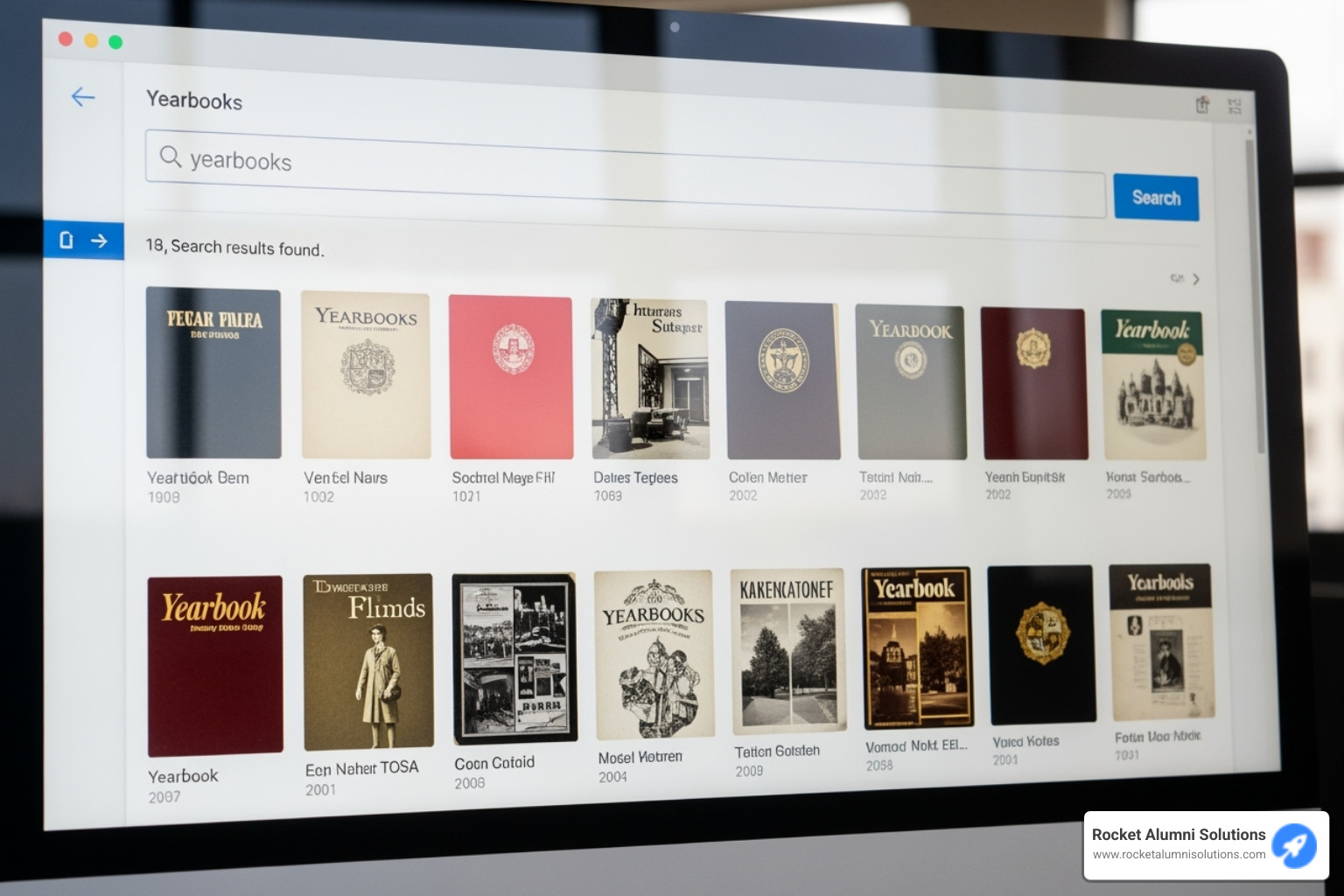
The magic behind searchable yearbooks lies in Optical Character Recognition (OCR) technology. When libraries scan physical yearbooks, OCR software analyzes each page and converts the printed text into searchable data. This means you can press Ctrl+F (or Command+F on Mac) and type in any name or keyword to find it instantly across hundreds of pages.
But here's where things get interesting. OCR quality varies dramatically depending on the original yearbook's condition and printing style. A crisp 1990s yearbook with clean fonts? The search works beautifully. A 1920s yearbook with fancy script lettering and faded ink? You might find yourself squinting at blurry scans while the search function misses half the names.
Handwritten inscriptions present their own challenge. All those heartfelt "Stay sweet!" messages and inside jokes that make yearbooks so personal? OCR can't read handwriting, so these treasures remain hidden from keyword searches. You'll need to browse page by page to find them.
Some older digitization projects only created scanned images without any text recognition at all. These yearbooks look great on screen, but searching them is like trying to find a needle in a haystack – you're back to flipping through pages manually, just like the old days.
Missing volumes and poor scan quality add to the puzzle. Many collections have mysterious gaps where yearbooks were lost, damaged, or never published. Sometimes the scanning process creates shadows or cuts off edges, making names unreadable even when you find the right page.
Despite these quirks, digital searching transforms yearbook research from a weekend project into a quick afternoon task. When it works well, you can locate every mention of a person's name, track their activities across multiple years, and even find unexpected connections through shared clubs or sports teams.
What if a Yearbook Isn't Online or Searchable?
Not every yearbook has made the digital leap yet, and that's where some old-fashioned detective work pays off. The good news is that librarians and archivists are usually eager to help, especially when they see genuine interest in preserving local history.
Contacting school archives should be your first move. Many institutions maintain physical collections that are much more complete than their online versions. McDaniel College, for example, keeps original yearbooks available for in-person viewing by appointment, including years that aren't digitized yet. A simple phone call or email often opens doors you didn't know existed.
Local libraries and historical societies frequently house yearbook collections from schools throughout their county. These librarians know their collections inside and out and might remember exactly where that 1967 high school annual is stored. Plus, they often have fascinating stories about the schools and communities represented in their archives.
Alumni associations can be goldmines of information and connections. These groups are passionate about their school's history and often maintain their own collections or know which graduates have rare yearbooks tucked away at home. They might even put you in touch with classmates who appear in the pages you're researching.
If you find a significant gap in digital collections, consider requesting digitization. Many institutions welcome community interest in preservation projects. At Rocket Alumni Solutions, we've seen how digitizing yearbook collections not only preserves fragile originals but also reconnects communities with their shared history. Our process carefully handles these precious documents while creating searchable digital versions that can be accessed by future generations.
When all else fails, manual searching through image-only scans becomes a meditation in patience. Yes, it takes longer than keyword searching, but there's something satisfying about finding an unexpected photo or reading the original layout designers' creative choices page by page.
Frequently Asked Questions about Maryland Digital Yearbooks
When it comes to accessing and using digital yearbooks Maryland institutions provide, we hear the same questions over and over. Let me share the answers to the most common ones, based on what we've learned from helping schools digitize their collections.
Are all online Maryland yearbooks fully searchable?
Here's the honest truth: not every digital yearbook Maryland you'll find online is fully searchable. It really depends on how well the digitization process went.
OCR quality makes all the difference. When yearbooks get scanned, special software tries to "read" the text and convert it into searchable words. But if the original yearbook pages were faded, used fancy fonts, or got scanned at low quality, the software might miss words or read them wrong. This means your search for "John Smith" might not find every mention of that name.
Some older digitized collections are just scanned images without any text layer underneath. Think of them as digital photographs of each page. You can see everything clearly, but you can't search for specific words – you'll need to flip through page by page, just like with a physical book.
Handwritten inscriptions add another layer of complexity. Those sweet personal messages and autographs that friends wrote in the margins? OCR can't read handwriting, so those won't show up in searches either. They're still visible in the digital version, but you'll have to spot them with your eyes.
Even when OCR works well, search limitations can vary by platform. Some let you search the entire yearbook at once, while others might only search one page at a time. It's worth experimenting with different search terms if you don't find what you're looking for right away.
What are the copyright rules for using photos from a digital yearbook?
Copyright questions come up a lot, and for good reason. The rules can seem confusing, but here's what you need to know.
For public domain materials, you're in the clear. Anything published before 1929 is generally free to use however you want. Many of those beautiful early 1900s yearbooks fall into this category, which is great news for genealogy research.
Fair use for research covers a lot of what people want to do with yearbook photos. If you're using a small portion of a yearbook for family history research, genealogy, or academic study, you're probably fine. The key is that it's non-commercial and educational in nature.
The difference between personal use and commercial use is huge. Printing a photo of your grandmother for your family album? That's personal use, and generally not a problem. Using that same photo to sell something or promote a business? That's commercial use, and you'd need permission from whoever owns the copyright.
Don't forget about privacy considerations for living individuals. Even if copyright isn't an issue, it's respectful to think twice before sharing photos of people who are still alive, especially in public forums or social media.
Many institutions, like McDaniel College, are upfront about this. They basically say "we're making these available for research, but figuring out copyright is your responsibility." It's their way of being helpful while protecting themselves legally.
When in doubt, assume you need permission for anything beyond personal research. A quick email to the institution that digitized the yearbook can often clarify what's okay.
How can I contribute a yearbook to a digital collection?
Got a yearbook that's not online yet? You might be sitting on a piece of history that others would love to access. Here's how to get it digitized and shared.
Contacting libraries or historical societies is your best first step. Reach out to the school's library or archives department, or try your local historical society. Many are actively looking to fill gaps in their collections. McDaniel College, for example, has specific years they're missing and would love to receive.
Each institution has its own donation policies. Some want to keep the physical book, others are happy to digitize it and return it to you. Some only accept yearbooks with significant handwritten notes or from certain time periods. It's worth asking about their specific needs and processes.
If the school can't digitize your yearbook right away, or if you want to keep the original, scanning services are an option. At Rocket Alumni Solutions, we specialize in changing physical yearbooks into high-quality, searchable digital files. We handle everything carefully and return the original yearbooks to you safely after digitization.
Sometimes community history projects pop up where local groups band together to digitize yearbooks from their area. Keep an eye out for these initiatives – they're often announced through local libraries, historical societies, or genealogy groups.
Contributing a yearbook feels good because you're helping preserve memories and history for future generations. Whether it's helping someone find a photo of their ancestor or allowing researchers to study local history, your contribution can make a real difference.
Conclusion: Preserve and Connect with Maryland's School History
We've traveled through decades of Maryland's educational history together, from the earliest 1897 "Reveille" at the University of Maryland to McDaniel College's comprehensive "Aloha" collection spanning over a century. These digital yearbooks Maryland institutions have preserved offer us something truly special—a window into the lives, dreams, and communities that shaped our state's rich educational heritage.
What strikes me most about these collections is how they transform dusty archives into living, breathing stories. When a genealogist finds their great-grandmother was captain of the debate team, or an alumnus finds a candid photo of their old study group, these digital treasures become bridges connecting past and present. They're not just records; they're the "story-like information" that brings our family histories to vibrant life.
The accessibility these digital collections provide represents a remarkable shift in how we preserve and share our heritage. No longer do we need to make appointments at distant archives or handle fragile, deteriorating pages. With a simple search, we can explore decades of school memories from anywhere in the world, 24 hours a day.
Yet as we've seen, this digital revolution is still unfolding. Some yearbooks remain trapped in image-only formats, others have gaps in their collections, and many smaller schools haven't begun digitizing at all. That's where the real opportunity lies—in ensuring these precious memories don't disappear with time.
At Rocket Alumni Solutions, we've made it our mission to help schools and institutions preserve their unique stories for future generations. Our digital recognition and display solutions transform traditional yearbooks into dynamic, interactive experiences that work on any device. We create animated flip books and searchable digital yearbooks that make school history engaging and accessible to alumni worldwide.
When we work with schools, we don't just digitize their books—we help them reconnect with their communities. Our social media integration and mobile accessibility tools ensure that these preserved memories can be shared, celebrated, and refinded by new generations. Every yearbook we digitize becomes a lasting legacy, safely preserved yet vibrantly alive.
If your Maryland school or organization has yearbooks gathering dust in storage, we'd love to help you transform them into the digital treasures they deserve to be. Together, we can ensure that no memory is lost and every story continues to inspire.
More info about digital yearbook services


















































































































